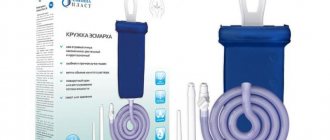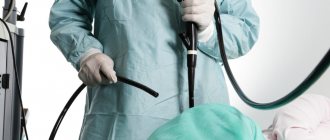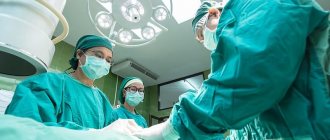The average person's intestinal tract contains an average of 3-8 kg of feces. These masses contain various bacteria, waste and all kinds of inclusions. The entry of fecal particles into various systems of the body outside the intestine is fraught with the development of sepsis and intoxication. Therefore, bowel cleansing before surgery on the gastrointestinal tract is a necessary procedure.
We will look at effective bowel cleansing methods indicated before surgery, including hemorrhoid removal.
Cleansing of the gastrointestinal tract is required to prevent the development of an infectious process, and for the convenience of the operation itself.
In the clinic, before the operation, the doctor advises the patient about the upcoming procedure and recommends a suitable method for cleaning the intestines from feces.
Depending on how extensive the operation is, cleansing using an enema, special medications, or hardware cleansing is possible.
Cleansing enemas
An enema is one of the simplest and most commonly used methods for removing feces. The procedure can be carried out either independently by the patient at home or by medical personnel in a medical facility.
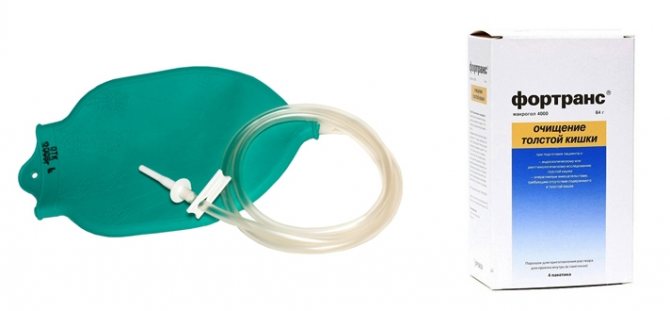
In the photo: Esmarch's mug and the drug Fortrans
With the help of an enema, cleansing in the hospital is carried out as follows:
- In the evening, 12-16 hours before surgery, the first enema is given.
- 1.5-2 liters of warm boiled water is injected into the lower part of the large intestine.
- The second procedure is performed in the morning on the day of surgery.
Cleaning products
Some patients have a negative attitude towards giving an enema. They can be replaced by a medicine to cleanse the intestines.
Laxative drugs are easy to use and safe for health. Such products are especially in demand for patients who have any pathologies in the rectum and anus: hemorrhoids, polyps, fissures, etc.
An intestinal cleanser can be produced in the form of tablets, syrups, water-soluble powders, and ready-made suspensions.
Depending on the mechanism of action, there are drugs that stimulate peristalsis, increase the volume of feces and dilute feces.
It is worth considering that the dosage of the medicine should only be determined by a specialist, taking into account the individual health characteristics of the patient and the nature of the upcoming operation.
Fortrans
The drug is produced by the pharmacological industry in the form of a powder for oral use. The product is sold in packages containing 4 sachets with the medicine. One portion of the medication should be dissolved in a liter of warm water.
Fortrans colon cleansing powder
The active substance of Fortrans does not enter the bloodstream from the stomach and does not affect other systems of the human body. The drug is excreted from the intestines with feces in the same form as it entered the gastrointestinal tract. Fortrans has a powerful laxative effect due to the active substance – macrogol. Once in the digestive tract, it swells and increases the volume of intestinal contents and stimulates peristalsis.
The drug is recommended for use before colonoscopy, irrigoscopy, MRI with the use of a contrast agent and various surgical interventions.
The product helps remove feces from all parts of the colon.
Duphalac
Duphalac is a lactulose-based laxative. Available in the form of a viscous yellowish syrup, ready for use. Duphalac is available in syrup form. To prepare for surgery, it is recommended to use about 100-150 ml of the drug . In most cases, doctors prescribe Duphalac as an adjuvant in combination with a cleansing enema.
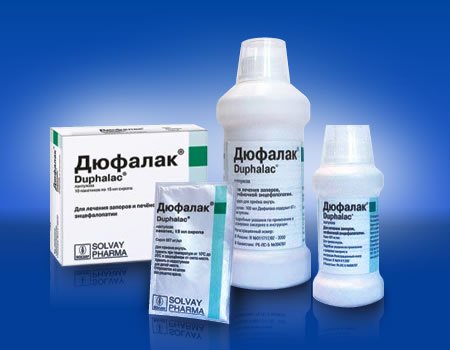
The product stimulates peristalsis and softens feces, facilitating their easy removal. Duphalac has a hyperosmotic effect and helps increase the contents of the large intestine.
Fleet Phospho-soda
Solution for oral use with osmotic action. Available in 45 ml bottles.
The product is a saline laxative that increases the content of the intestinal lumen and softens feces. It should be taken for 2 days before surgery, immediately after breakfast.
While using Fleet Phospho-soda, you need to increase the amount of fluid you consume and follow a special diet prescribed by your doctor.
The medicine is used only to prepare for diagnostic or surgical intervention and is not used to treat constipation.
Preparation for the procedure
For a successful outcome of the operation, preparation before laparoscopy is absolutely necessary. It begins from the moment the woman is explained the method of endoscopy and its necessity. At the same time, it is decided when laparoscopy will be performed.
Before laparoscopy you need to:
- Set up a woman correctly. All patients are afraid to undergo laparoscopy, because it is a surgical intervention, albeit with minimal tissue trauma. At this stage, preparation for laparoscopy consists of obtaining information about the upcoming manipulation, possible complications, and risks. Typically, all information about the operation and its intricacies should be provided by the attending physician.
- A preliminary examination of the body is required. Before prescribing laparoscopy, patients undergo an ultrasound examination of the appendages and other genital organs. Consultation with a therapist, cardiologist and other specialists is required. According to indications, the doctor may prescribe other types of diagnostic examination.
- Laboratory examination. Preparing a patient for laparoscopy involves prescribing tests that are necessary to accurately determine the possibility of surgery. Laboratory examination begins one and a half months before the date of intervention. Patients prepare for laparoscopy, donate blood for blood group, Rh, and biochemistry. Tests for various infections are required. At this stage, the patients' relatives must donate blood to a blood bank in case something goes wrong during the operation.
Before laparoscopy, the patient must undergo a certain set of tests
- The doctor and the patient begin to prepare at the time of collecting the anamnesis. More than seventy percent of success depends on this stage. Such preparation for surgery allows you to find out what chronic diseases the patient has, what injuries she had, the presence of allergies, and intolerance to medications. All this information will help to avoid complications and unexpected consequences during the procedure.
- Diet. Two weeks before the scheduled procedure, patients should begin preparing for laparoscopy in gynecology. During this period, nutritional adjustments are made: fats and smoked foods are limited. Three days before the procedure, the amount of food eaten is reduced. From this period, laxative medications are prescribed to eliminate gas formation.
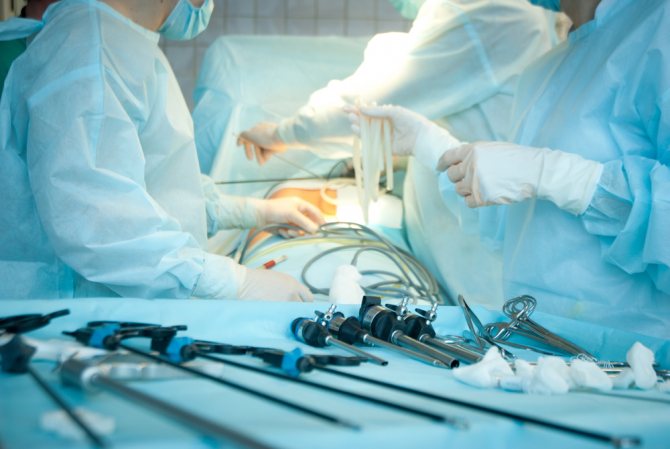
- The day before the operation, an enema is given. During this time, the amount of food and liquid is strictly limited. A preoperative enema is performed to cleanse the intestines. If patients are prone to constipation, then this procedure is performed several times. This is necessary, because under the influence of anesthesia the body relaxes greatly, which can lead to its spontaneous cleansing. To prevent this from happening, an enema is required before surgery.
Before the procedure itself, the patient takes a shower using special disinfectants. Hair is removed from the area of intended intervention. A woman can shave herself, immediately before surgery, or she can trust the medical staff. They shave the navel area, the lower abdomen, and the entire groin area. If a woman shaved two days before the operation, then the procedure should be repeated before laparoscopy, since by this time the hairs will have already grown back.
The right attitude helps not only to carry out the procedure efficiently, but also to quickly recover after it.
Hardware colon cleansing
In some cases, removing feces from the rectum alone is not enough. Some operations require complete cleansing of the intestines from feces. In this case, resort to hardware action.
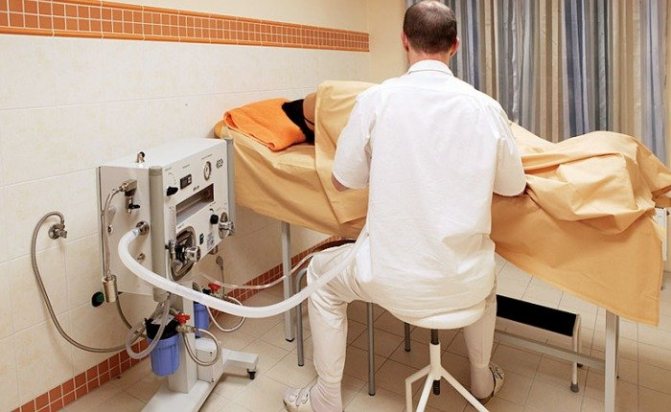
The procedure must be carried out by a specialist with constant monitoring of the patient’s condition.
If such a procedure is necessary, then bowel cleansing is carried out in a sanatorium or clinic.
There are also organizations that provide a similar service at the patient’s home, but it is not recommended to use it. The fact is that during hardware bowel cleansing, the patient may experience weakness, nausea and general discomfort caused by a decrease in blood pressure.
A small percentage of patients also develop pathological symptoms: shock, vomiting, sharp intense abdominal pain.
Therefore, during hardware cleaning, it is necessary to have equipment in the immediate vicinity to provide emergency medical care.
Analysis of possible complications
The IVF reproductive health clinic is equipped with modern equipment, and laparoscopy is performed by experienced surgeons. Complications are extremely rare! Feeling may worsen after the introduction of trocars and carbon dioxide. The complications are:
- gas embolism;
- pneumothorax;
- heavy bleeding;
- damage to the outer lining of the intestine;
- subcutaneous emphysema.

A big problem is the formation of adhesions. Such a complication entails:
- infertility;
- intestinal obstruction;
- dysfunction of the excretory organ of the gastrointestinal tract.
Adhesions are not always a confirmation of the doctor’s inexperience. Their formation is influenced by many internal processes. Each body is individual, and this should not be forgotten!
Surgeons without experience working in gynecology often condemn the patient to agony after laparoscopy. They damage small vessels, resulting in slow bleeding in the abdominal cavity. If the “deficiency” is not corrected during laparoscopy, then the mentioned complication will arise! Other serious consequences in gynecology:
- purulent inflammation;
- hernia;
- large hematomas.
Inexperienced specialists in the field of gynecology also make a number of other serious mistakes; we will not mention them here. Trust your health and future to professionals! Sign up for a consultation with a specialist in the field of reproductive health and laparoscopy on the website or by phone. The doctor will conduct an examination, identify the problem, analyze the feasibility of the operation and announce its cost.
Preparation for surgery involves undergoing mandatory diagnostic procedures: ultrasound, fluorography, ECG, CT or MRI. It is also necessary to visit the necessary specialists, which may include a gynecologist, therapist, neurologist, etc.
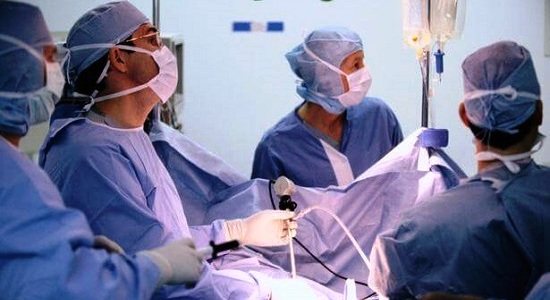
An integral part of the examination is the collection of tests:
- coagulogram;
- determination of Rh factor and blood group;
- general urine/blood test;
- blood biochemistry;
- testing for hepatitis, HIV, syphilis.
Since the validity of the results is quite limited, tests should be taken a maximum of 10–14 days before laparoscopy.
Colonics
The procedure for cleansing the intestines in a clinical setting is called colon hydrotherapy or colonics:
- Cleansing is carried out using a special apparatus.
- A hose is inserted into the patient’s rectum, through which clean water or herbal infusion is supplied in portions to the digestive tract.
- The device for hydrocolotherapy is designed in such a way that the waste liquid is removed into a special reservoir.
- The manipulation continues for about 20-40 minutes.
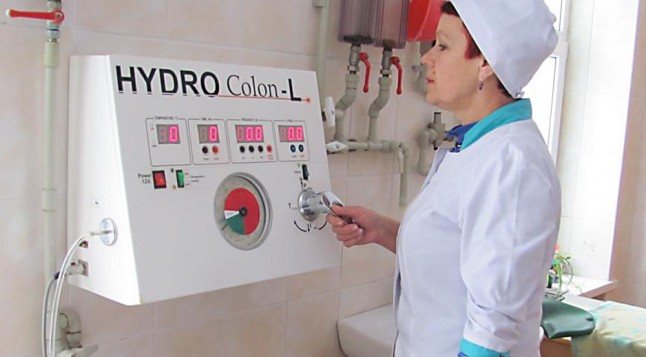
The main advantage of the procedure is that it allows you to remove feces from all parts of the intestinal tract and minimize the risk of infection during surgery.
Hydrocolotherapy is a significant burden on the body, so it is carried out only if there are indications for this particular method of cleansing the intestines.
Clearing the digestive tract and intestines of feces is an important part of preparing for surgery.
The procedure can be carried out using pharmacological drugs, an enema or hardware techniques.
The most appropriate method of cleaning is determined by the doctor, based on the specifics of the upcoming surgical intervention and the individual health characteristics of the patient.
Optimal time for laparoscopy
Respiratory diseases are among the contraindications to the laparoscopic procedure. However, it is worth noting that urgent surgical intervention may force specialists to perform their work if the patient has certain symptoms of acute respiratory infections. Knowledge about the principles of preparation for laparoscopy allows you to avoid severe complications and significantly reduce the rehabilitation period to a matter of days.
The mentioned surgical and diagnostic method in gynecology is not always effective. Why? Inexperienced doctors incorrectly determine the date of intervention. IVF doctors do not make such mistakes. Specialists in the field of reproductive health and gynecology are well aware that the effectiveness of the method depends on what day of the menstrual cycle the operation is scheduled for.
Attention! Infection, internal bleeding or other complications may occur after laparoscopy done during menstruation.

Our specialists prescribe the operation immediately after ovulation. The equator of the monthly cycle is the optimal period for laparoscopy. It is after ovulation that the cause of infertility becomes clear. Other clinical symptoms of diseases known in gynecology are also clearly visible.
Despite the safety of surgical intervention, which has recently appeared in gynecology, coherence among specialists is important. Read more about how laparoscopy is done at IVF.
After preoperative preparation, pneumoperitoneum is applied. To do this, an incision is made in the navel area, the diameter of which varies from 5 to 10 mm. Surgeons lift the anterior abdominal wall, after which a Veress needle is inserted into the pelvic area. Carbon dioxide is pumped through it (from 3 to 4 liters).
The introduction of tubes is the next stage of laparoscopy in gynecology. Before manipulation, the Veress needle is removed. A trocar with the main tube is inserted into the formed space. After the puncture, the first element is removed. The tube remains inside as the laparoscope is inserted through it. The device is equipped with a light source and a video camera.
To perform laparoscopy, several more incisions are also made. Manipulative instruments are installed in them. Next, the condition of the pelvic organs is assessed, the problem is identified, or a planned removal is carried out. The progress of laparoscopy depends on the characteristics of the specific clinical picture in gynecology.
Patient reviews
Yulia, Moscow: “They suggested doing colonics before surgery on the small intestine. I was very doubtful and worried, but it turned out that everything was happening very delicately. The conditions are comfortable, all materials are disposable. The process is unpleasant, but there is no painful sensation. But afterwards you feel clean and light. And the doctor praised me after the operation for having a clean intestine.”
Irma, Perm: “Before the operation, I took a laxative for quick cleansing. It works effectively, and you don’t need to go for an enema in the morning. But the taste is unpleasant, and drinking a whole liter of solution at a time is very difficult.”
Ilya, Ryazan: “I had polyps removed from my intestines. I took Fortrans. Very convenient, no awkward procedures in the enema room. I am glad that the doctor recommended this remedy to me.”



